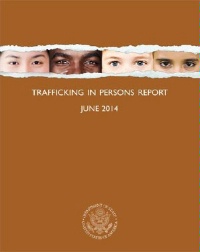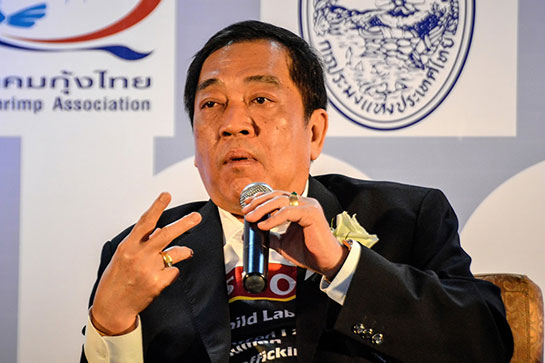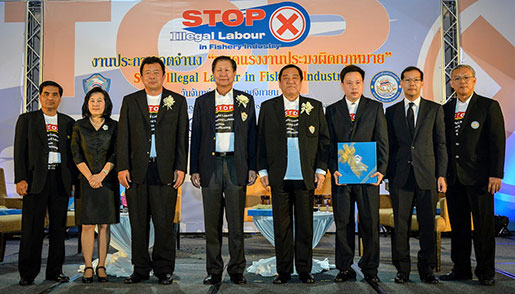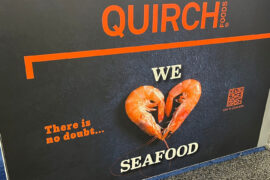After much speculation and deliberation, the hammer fell on June 20 as the US State Department downgraded Thailand, Malaysia, Venezuela and Gambia to Tier 3 status, the lowest ranking in its Annual Trafficking in Persons (TIP) report. The action lumps the four nations into a list of 23 countries – including North Korea, Iran, Syria, the Central African Republic, Algeria and Cuba – said to allow or condone modern day slavery through forced servitude or other means of labor exploitation.
Concerned that bad press about accusations of “slave labor” and “human trafficking” left unanswered could lead to consumer boycotts and the reduction of orders by buyers, representatives of the Thai Frozen Foods Association (TFFA) are in the United States this week consulting with the National Fisheries Institute (NFI) as well as major North American importers and retailers of seafood and other frozen products to discuss how best to establish and certify independent third-party inspection of food production plants in Thailand to assure the public that workers are indeed treated fairly.
 “The US Trafficking in Persons Report has created a bad situation for Thai food industries, so the association and involved organizations need to urgently solve the problem. Exports are not yet impacted, as Thai enterprises have always worked on labor protection and addressed the concerns of our trading partners,” said Dr. Poj Aramwattananont, TFFA president.
“The US Trafficking in Persons Report has created a bad situation for Thai food industries, so the association and involved organizations need to urgently solve the problem. Exports are not yet impacted, as Thai enterprises have always worked on labor protection and addressed the concerns of our trading partners,” said Dr. Poj Aramwattananont, TFFA president.
The mobilization to limit commercial damage resulting from reaction to the TIP report, which claims, among other things, that the Thai government has not done enough to thwart illegal labor trafficking in the commercial fishing industry, is expected to garner support from NFI companies that import shrimp from reputable producers in Thailand.
John Connelly, president of the Arlington, Virginia-headquartered trade association, stated that most NFI members doing business with Thai suppliers already “require rigorous third-party audits of their supply chain in order to ensure it is free of labor abuses. In fact, NFI itself has conducted the only comprehensive analysis of the leading global social responsibility standards in order to assist our members in finding the most thorough and credible labor systems.”
 “The US Trafficking in Persons Report has created a bad situation for Thai food industries, so the association and involved organizations need to urgently solve the problem,” says Dr. Poj Aramwattananont, president of the Thai Frozen Foods Association.
“The US Trafficking in Persons Report has created a bad situation for Thai food industries, so the association and involved organizations need to urgently solve the problem,” says Dr. Poj Aramwattananont, president of the Thai Frozen Foods Association.
Connelly urged consumers not to misunderstand the TIP report as an indictment of the entire industry, but rather to view it as a snapshot of challenges that need ongoing Thai government attention.
“NFI recognizes and appreciates Thailand’s renewed focus on stamping out labor challenges in the seafood sector,” said the president. “Our members continue to work with committed suppliers and partners there, to lead the way in not only pushing for change, but providing products that are produced through safe, fair, ethical labor practices.”
Negative Publicity Mounts
Sensational and misleading headlines appeared in US newspapers and online over the weekend. Among them, “Slavery and the Shrimp on Your Plate” and “Thai Seafood is Contaminated by Human Trafficking,” were published by The New York Times on Sunday. Its editorial board, citing TIP report charges that undocumented migrant laborers on Thai fishing boats [primarily from Myanmar and Cambodia] are forced to work like slaves, opined that “the revelations about Thailand should persuade major global corporations, including Costco, Walmart, Carrefour and Tesco, that their business models have to change. They should refuse to import from fishermen or companies that have been reliably identified by watchdog groups as using slave labor…”
While The Times’ anti-slavery stance is no doubt well intended, unfortunately its June 22 editorial page prose tars and feathers the entire Thai seafood sector, unfairly sullying those in the industry who have done much in recent years to improve working conditions on all fronts.
The truth is that the vast majority of shrimp processed in Thailand is not landed by fishing vessels crewed by undocumented, exploited workers. In fact, very little is even supplied by fishermen. Aquaculture, not fishing, has dominated and driven Thailand’s shrimp industry for the better part of three decades. Most of the shrimp frozen in that country and shipped to the USA, Europe, Japan and other major overseas markets is sourced from well managed ponds operated by farmers who adhere to good labor practices which strictly prohibit forced labor, child labor and employment of persons procured by brokers suspected of being engaged in or affiliated with illegal human trafficking networks.
 Members of Thailand’s fish, seafood and food processing sectors have banded together to work with the Department of Fisheries to stop illegal labor and human trafficking in the Thai fishery industry.
Members of Thailand’s fish, seafood and food processing sectors have banded together to work with the Department of Fisheries to stop illegal labor and human trafficking in the Thai fishery industry.
“For the first time in history, the eight key Thai seafood and fishing associations signed a memorandum of understanding, in February of 2014, with an outline roadmap for the sustainable development of the Thai fisheries industry. The alleged ‘slave’ labor aspect will be positively addressed in this work,” said Charoen Pokphand Foods President and CEO Sripratak in a report published by FrozenFoodsBiz.com last week.
“The coalition has put forward a Fisheries Improvement Plan (FIP) for the Gulf of Thailand and the Andaman Sea,” he continued, “and is attempting to raise an initial US $500,000 to engage the Sustainable Fisheries Partnership (SFP) and the World Wildlife Fund (WWF), which are global NGO’s that have the skills and expertise to complete these studies. All of this is aimed at positively encouraging all stakeholders to jointly manage Thailand’s seafood industry in an ethical and sustainable manner.”
 In addition to charging that “indentured servants” are working 18 to 20 hours per day on fishing boats for little or now pay, the US State Department’s TIP report says that many in the migrant worker community end up in the sex trade. It called for an investigation into government complicity and the establishment of a task force to present sex trafficking and sex tourism.
In addition to charging that “indentured servants” are working 18 to 20 hours per day on fishing boats for little or now pay, the US State Department’s TIP report says that many in the migrant worker community end up in the sex trade. It called for an investigation into government complicity and the establishment of a task force to present sex trafficking and sex tourism.
Meanwhile, the State Department has seen fit to rank the United States in the Top Tier, even while confirming that sex trafficking and forced labor, including domestic servitude, is a problem nationwide as well as in US insular areas of American Samoa, the Commonwealth of the Northern Mariana Islands, Guam, Puerto Rico, and the US Virgin Islands.
Disappointment, Disagreement
Sihasak Phuangketkeow, the permanent secretary of Thailand’s Foreign Ministry, has responded to the Tier 3 downgrade by saying that the Thai government is “disappointed and disagrees” with the decision, especially since it has provided the US State Department with a lengthy description of the numerous measures it has taken to combat human trafficking.
“With or without the TIP report, Thailand will continue with our efforts to tackle this problem. It’s a scourge we are facing, and a challenge to mankind,” said Sihasak. In the past year alone the government has brought over 400 cases and prosecuted more than 200 persons for human trafficking, he added.
Consequences of the downgrade include limited sanctions imposed by the US government, such as the suspension of non-trade and non-humanitarian related aid, as well as possible opposition from Washington to requests for aid submitted to the International Monetary Fund or World Bank. While implementation of trade sanctions is not allowed in this instance under US law, the possibility of consumer boycotts exists.
Thai exporters to the United States, a nation that historically has been its largest market for seafood, can be expected do their utmost to address consumer concerns and work hard to keep the pipeline open. They shipped approximately $1.2 billion worth of shrimp and prawns (primarily frozen) to the USA in 2012, while earning $594 million for tuna, $70 million for crab, and approximately $30 million in squid sales.
The Southeast Asian nation ranks at the world’s third largest exporter of fishery products, after China and Norway. The sector, which reportedly provides gainful employment for over 650,000 people, generated more than $8.8 billion in sales of 1.9 million tons of farmed shrimp, tilapia, tuna and other fish in 2012. – JMS





